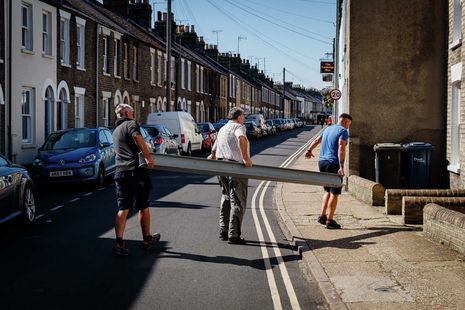Gown vs town? Local investment plans must remember Cambridge is not just a university
Unless revised, the Cambridge 2040 development plans will only exacerbate the divides in this already unequal city, argues Oscar Chatfield

As the UK faces continued sluggish productivity growth, a widening North-South divide and an impending climate crisis – end to government underinvestment, which has plagued national politics for more than a decade, is essential to creating a greater number of good-quality jobs, innovation and economic stability. However, the opponents to good quality investment do not exclusively reside in Whitehall and local communities often constitute a sizeable challenge to quality investment. Some oppose onshore wind farms, put up resistance to the construction of affordable housing in their areas, and have opposed HS2 for the degradation that it has caused to the environment. In Cambridge too, local councils have voiced opposition to government plans to invest in the city’s science sector to make it the ‘Silicon Valley of Europe’.
This opposition to investment up and down the country, though, is not purely the work of self-interested NIMBYs who have lost all sense of greater social responsibility (although these undoubtedly do exist), but represents a serious failing of government policy to engage with the interests of local communities. Instead of dependence on top-down planning, national-scale projects should be devised with greater participation from local governments and communities. As students, we have the responsibility to side with local councils to oppose externally imposed policy decisions, which all too often benefit the university, instead of addressing the most pressing issues faced by the city.
“The initiative does not seek to directly raise standards for those already residing in Cambridge”
The plans for the government’s Cambridge 2040 initiative were first announced in July 2023 and a £10 million investment in the city was further announced in March’s budget. Whilst it has been welcomed by the university it has faced considerable opposition from the city council’s Lib Dems, who have cited worries about the potential for planning powers to be taken from local hands and the unrecognised strain that it would add to the already-struggling water infrastructure. In their own statement, the Greens argued, “The proposal totally ignores all that Cambridge residents have been calling for in recent years: affordable housing, a reduction in the city’s extreme inequalities, and real solutions to the climate and biodiversity emergencies.”
The government’s ‘Case for Cambridge’ report cites how the construction of 150,000 new homes by 2050 could add £6.4 billion to the national economy. While important, the strategy for growth is primarily centred on attracting external, ‘high-skilled’ labour to fulfil demand in the life sciences and technology business environment, and on delivering greater laboratory space. Thus, the initiative does not seek to directly raise standards for those already residing in Cambridge, or to solve local problems of water shortage and inequality. Rather, it seeks to make the city increasingly attractive to businesses to work alongside the university. This will only increase the town-gown divide, further alienating those in the community without an association with the university and has the potential to worsen Cambridge’s affordability problem; already the most unequal city in England.
“It is important to consider how and by whom economic growth is achieved”
In opposing the Cambridge 2040 initiative, Cambridge City Council is not voicing its opposition to development of the area. The city council has its own urban development plans for the years 2022 to 2027, which the government has failed to consider in its own plans, and it lists the tackling of inequality through affordable housing as a key priority. Economic growth is essential to reducing Cambridge’s inequality extremes, but it is important to consider how and by whom economic growth is achieved. By building housing to appeal to external, ‘highly skilled’ workers Cambridge’s inequality extremes are likely to persist.
The differing responses of the university and local councils to the new investment plans should not reflect a divide between Cambridge’s student population and local residents on the issue. Both are valuable constituents of the community with common interests in the city’s cost-of-living, safety and infrastructure. Affordability already poses a massive challenge to both students and residents, and investments should ensure that prices remain sustainable for future students and locals alike. Students should oppose projects which will perpetuate inequality and inaccessibility in the city which serves as their term-time home and the home of more than 12,000 staff who are fundamental to students’ education.
In Cambridge (and across the country), growth needs to be achieved in a way that will uplift rather than alienate its local residents. This cannot be achieved so long as the government continues to impose externally devised projects without the proper consultation and cooperation of local communities. Local resistance is indicative of failing policy, and in Cambridge, students should oppose investment which will lead to worsening outcomes for the permanent residents of the city. The Cambridge 2040 initiative should be revised alongside local councils and residents in order to bring growth and development to the city without inflicting localised harms.
 Comment / Cambridge is right to scrap its state school target1 May 2024
Comment / Cambridge is right to scrap its state school target1 May 2024 News / Academics call for Cambridge to drop investigation into ‘race realist’ fellow2 May 2024
News / Academics call for Cambridge to drop investigation into ‘race realist’ fellow2 May 2024 News / Gender attainment gap to be excluded from Cambridge access report3 May 2024
News / Gender attainment gap to be excluded from Cambridge access report3 May 2024 News / Cambridge postgrad re-elected as City councillor4 May 2024
News / Cambridge postgrad re-elected as City councillor4 May 2024 Comment / Accepting black people into Cambridge is not an act of discrimination3 May 2024
Comment / Accepting black people into Cambridge is not an act of discrimination3 May 2024





